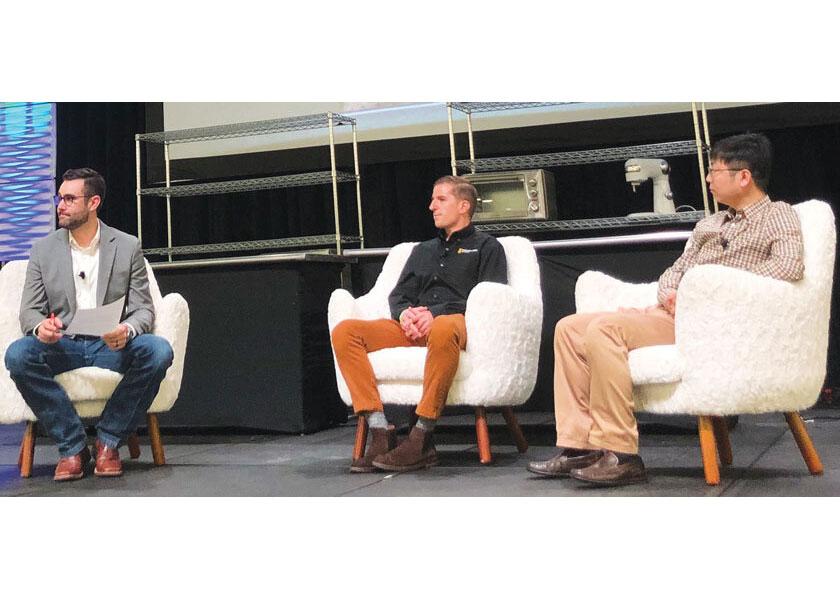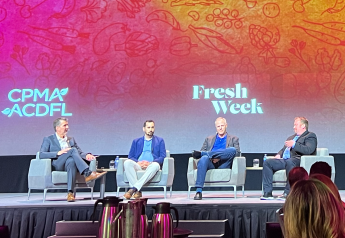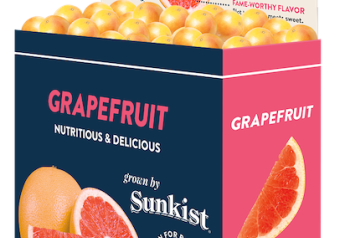‘Eye on Potatoes’ podcast looks at inflation supply chain resiliency

ANAHEIM, Calif. – Ongoing pandemic- and climate change-related shocks may require suppliers to invest in supply chain resiliency over efficiency in the years ahead.
That was one observation made Jan. 5 on the National Potato Council’s “Eye on Potatoes” podcast.
The podcast was recorded live at the 2022 Potato Expo show floor and featured insights on inflation from two extension economists from the University of Idaho.
The podcast, hosted by Montana television and radio farm broadcaster Lane Nordlund, featured guests Pat Hatzenbuehler and Liang “Jimmy” Lu, both assistant professors of agricultural economics at the University of Idaho.
Nordlund said fertilizer prices have jumped between 150% and 300% in the past year, and he asked the panelists about the reasons behind that hefty increase.
Hatzenbuehler said the COVID-19 pandemic created massive changes in behavior in fundamental ways, including how consumers spend their days, as well as their money.
For example, he said there has been a big shift from purchases of services to purchases of goods, such as purchases of exercise bikes versus going to the gym.
“That has caused massive changes to supply chains, to the inputs that are needed to make those goods, and those things have caused a lot of the things that we're seeing,” he said, noting that the tight availability of farm workers during the pandemic also created higher labor costs for growers.
At the same time, the panelists said an energy crisis in China last fall appears to have resulted in reduced fertilizer exports to world markets.
Resilience versus efficiency
Lu said, up until the pandemic, the U.S. supply chain was geared toward efficiency rather than resilience.
The starting point of the global economy is “just-in-time” logistics, he said.
“Don’t get me wrong, it worked for us so well for so many years,” he said. After the pandemic, there is more thought to building resilience into the supply chain, he said.
Part of the difficulty now is not knowing the reasons behind input shortages.
“The COVID-19 situation is adding another layer of difficulty for us to analyze from the supply chain point of view,” Lu said, adding that it has been unclear whether fertilizer, for example, was delayed in ships waiting for port access or whether China’s energy shortage had cut fertilizer output.
“I guess that, at the moment, the difficulty is to analyze whether (the problem) is somewhere in the logistics or if it's not really being produced. That's probably some of the main challenges,” Lu said.
Hatzenbuehler said that potato and other food suppliers who were forced to pivot from foodservice to retail customers during the pandemic incurred big costs. Adding supply chain flexibility into a business, such as investing in packaging that could serve both retail and foodservice, is both costly and time-consuming, he said.
“We should have a very, very careful study to understand how costly it will be to build resiliency,” Lu said.
Whether that investment can pay off depends on variables such as how long the pandemic lingers.
“We're still stuck now,” Lu said. “But will it go away? Or do we have to deal with it long term?”
Lu said that means any analysis of the next 10 to 20 years must account for factors such as climate change, pandemics and other “risky” events.
“And then we also have to understand what the cost is to build that extra resiliency; then, the two things that gets together would help us to make a well-informed decision,” Lu said.
Inflation effect
Nordlund asked the economists whether China will continue to be a major importer of agricultural commodities or will instead move to become less reliant on food imports and seek to produce more crops for domestic consumption.
Lu said China does not have a comparative trade advantage to produce many agricultural products, but is better served to import farm goods.
However, the government of China has indicated it desires to produce more food to become less reliant on imports.
“I don't think it's a very wise thing to do and it's very costly,” Lu said, speaking of China’s drive to become more self-sufficient in food production.
Hatzenbuehler said the lack of transparency in China’s economy has been an issue.
“The way that that information gets disseminated can lead to uncertainty with regard to making decisions within the supply chain,” he said.
Lu said inflation naturally follows if more countries in the world retreat from free trade and, instead, try to produce more of their own goods where those countries may not have a comparative advantage.
“We’re going to produce less efficiently and we’re going to see higher prices if we don’t want to trade anything,” he said.
Because demand for potatoes is relatively stable whether prices are high or low, Hatzenbuehler said inflation may not necessarily be bad for potato growers.
“If your output prices increase more than your input costs, you end up increasing your profits,” he said.
That means that negotiations to protect margins with both input suppliers and customers are very important, he said.
Both Lu and Hatzenbuehler said investments in labor-saving technology also are critical for growers in the current era of rising farm wages.
Sponsored by Syngenta, the “Eye on Potatoes” podcast features two new episodes per month and is available online at https://www.nationalpotatocouncil.org/events/eye-on-potatoes-podcast/, or wherever podcasts are found.
Related articles:







